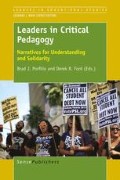Abstract
This has been a year of magical thinking. On the personal front, I helped to hospice my mom’s passage onto the spirit world, coming to new depths of understanding that grief is indeed a “place none of us know until we reach it” (Didion, 2005). On the global political front, while high intensity warfare persisted in places like Nigeria, South Sudan, Afghanistan, Syria, and the Ukraine, it was the low-intensity forms of perpetual war (against the poor, black, and brown) in the U.S. that captured public attention.
Access this chapter
Tax calculation will be finalised at checkout
Purchases are for personal use only
Preview
Unable to display preview. Download preview PDF.
References
Agathangelou, A. M., Daniel, B., & Tamara, L. S. (2008). Intimate investments: Homonormativity, global lockdown, and seductions of empire. Radical History Review, 100, 120–143.
Bhandar, B. (2010). Post colonies and capitalism: Why the colonial still matters. Retrieved December, 2010, from Critical Legal Thinking website: http://criticallegalthinking.com/2010/12/02/postcolonies-and-capitalism-why-the-colonial-still-matters/
Davis, A. Y. (2011). Are prisons obsolete? New York, NY: Seven Stories Press.
Debord, G. (1967). The society of the spectacle. New York, NY: Zone Books.
Delpit, L. (1996). Other people’s children. New York, NY: New Press.
Didion, J. (2007). The year of magical thinking. New York, NY: Random House LLC.
Duggan, L. (2012). The twilight of equality?: Neoliberalism, cultural politics, and the attack on democracy. Boston, MA: Beacon Press.
Fukuyama, F., & Allan, B. (1989). The end of history? (Vol. 16). National Affairs, Incorporated.
Giroux, H. (2005). Cultural studies in dark times: Public pedagogy and the challenge of neoliberalism. Fast Capitalism, 1(2), 1–16.
Giroux, H. A. (2008). Education and the crisis of youth: Schooling and the promise of democracy. The Educational Forum, 73(1), 8–18.
Kazanjian, D. (2003). The colonizing trick: National culture and imperial citizenship in early America. Minneapolis, MN: University of Minnesota Press.
Rifkin, M. (2013). Settler common sense. Settler Colonial Studies, 3(3–4), 322–340.
Saltman, K. J. (2000). Collateral damage: Corporatizing public schools–A threat to democracy. Lanham, Maryland, MD: Rowman & Littlefield.
Tuck, E., & Wayne, Y. K. (2012). Decolonization is not a metaphor. Decolonization: Indigeneity, Education, (1), 1–40.
Editor information
Editors and Affiliations
Rights and permissions
Copyright information
© 2015 Sense Publishers
About this chapter
Cite this chapter
Grande, S. (2015). Afterword. In: Porfilio, B.J., Ford, D.R. (eds) Leaders in Critical Pedagogy. Leaders in Educational Studies. SensePublishers, Rotterdam. https://doi.org/10.1007/978-94-6300-166-3_18
Download citation
DOI: https://doi.org/10.1007/978-94-6300-166-3_18
Publisher Name: SensePublishers, Rotterdam
Online ISBN: 978-94-6300-166-3
eBook Packages: Humanities, Social Sciences and LawEducation (R0)

